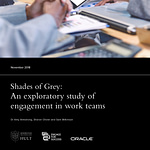This paper (click here to download the full report) sets out the findings of research, conducted by Ashridge between November 2011 and November 2012, through in depth interviews, exploring engagement through the eyes of 16 UK CEOs.
The research reveals that CEOs see engagement as encompassing dialogue and strategic narrative within their organisations which, they believe, creates emotional connection and purpose among employees. The outcome of engagement is seen as an organisational climate where people choose to give the very best of themselves at work.
When asked what stops leaders from engaging with engagement, three barriers emerged:
- Shortcomings in leadership capability that hinder engagement, such as poor self-awareness on the part of leaders.
- The leader recognises that they may be a potential barrier to engagement. Traits such as leader pride may lead to disengaging leadership behaviours.
- The culture and system in which UK business operates is seen as antithetical to engagement, such as organisational hierarchy, or the drive for short-term results.
Background
Research shows that focussing on leadership and its role in engagement can lead to an increase in employee satisfaction, organisational commitment, employee retention and discretionary effort. Leaders are ‘climate engineers’, setting the culture and tone for engagement across the entire organisation.
However, failure to foster a culture of autonomy, empowerment and challenge, the physical and emotional distance between leaders and staff, bureaucracy, hierarchical cultures, controlling managerial practices, and a lack of trust in senior managers are often cited as barriers to engagement.
Research Objectives, limitations and methodology
This research set out to answer 4 questions:
- How do leaders define engagement?
- What is stopping leaders from engaging with this important topic?
- What do they feel are the intrinsic (i.e. within themselves) and extrinsic (i.e. environmental) factors that get in the way?
- Why is engagement not happening more in the UK
This research sought to elicit personal thoughts and experiences through in-depth interviews with CEOs. The findings reflect the views of 16 CEOs and are not generalizable across the entire CEO population. The interview sample became self-selecting, with those CEOs interested volunteering, and as such there were more engagement champions that sceptics.
Eleven of the leaders are from the private sector, two from the public sector, and three from the not-for-profit sector. Five work in FTSE 100 companies, five work in SMEs. A range of industry sectors were represented including healthcare, training, local government, financial services, charities, professional services, energy and retail. All are working in UK-based organisations.
How do CEOs define engagement?
“A long term process, the outcome of which is a choice made by employees to give the very best of themselves at work.”
“An on-going two-way dialogue between leaders and staff, the outcome of which is that people right across the organisation are able to play their part in contributing to the organisational ‘story’.”
“People’s hearts and minds being connected to a common purpose.”
Multiple meanings – “The broadest definition of engagement is more useful because it gives you more room for doing things differently and coming up with new ideas.”
CEO barriers to engagement
Leadership Capability
- Fear of feedback
- Double edged nature of leadership
- Finding new ways of leading
- Challenge of self-awareness
The Leaders Themselves
- Personality and values
- Lack of self-confidence
- Not showing vulnerability
- Leader “hubris”
Culture, System and Hierarchies
- Out-dated leadership models
- Short-termism and focus on results
- Economic climate
- Organisational hierarchies




